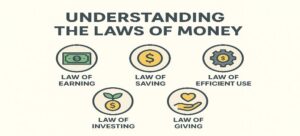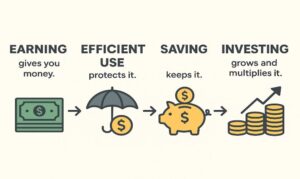Currently Empty: UGX 0

WAKE UP: 65% of Men and 70% of Women are Financially Illiterate. Worldwide, 35% of men are financially literate compared with 30% of women according to the World Economic Forum. This affirms that the majority of our citizens (65% of men and 70% of women) are financially illiterate or have very low financial literacy levels.
The financial literacy article series explore the twelve (12) essential financial skills rarely taught at school. Each article will be examining an essential financial skill every month.
Key Takeaways
- WAKE UP: 65% of Men and 70% of Women are Financially Illiterate
- It is never too late to start the journey to acquire essential financial skills rarely taught at school and begins with the first financial skill.
- Understanding the Laws of Money –every field in the universe has its laws, equally, money has its own.
- “Earning gives you money. Efficient use protects it. Saving keeps it. Investing grows and multiplies it.”
Before we delve into the first essential financial skill, let’s begin with the basics.
- What is financial literacy?
- Why is it important to pay attention to financial literacy?
- Introducing the financial skills everyone needs to know
- The first essential financial skill.
What is financial literacy?
Financial literacy is about having the skills and ability to manage money well. These are the basic skills needed to handle money wisely: how to attract, effectively use, invest and protect it. Financial literacy is well known for setting the foundation for a good relationship with money. It is emphasized that high financial literacy is closely associated with high household wealth.
So, when you are financially literate, you are able to understand how money works, how to manage it, where it is derived from, budgeted for, used, saved, invested, and protected. To simply put it, financial literacy is about understanding (knowing) the management of money. It is thus a life-long pursuit journey to better financial well-being.
Why is it important to pay attention to financial literacy
Everyone directly or indirectly uses money. In today’s fast changing and interconnected world, financial literacy is a bridge between where you are and where you want to be financially. For instance, the importance of financial literacy is emphasized in the United States of America, with the month of April each year dedicated to promoting public financial education and money management habits. In Rotary, the month of September (Basic Education and Literacy) and October (Economic and Community development) all have financial and money management components for individuals and communities.
So, why does financial literacy matter;
- Helps to empower individuals to make informed and better choices about money. Enhanced financial awareness, knowledge, skills, attitudes and practices position you to make smarter financial decisions.
- Enhances individuals’ ability to manage their finances wisely, reduces dependency on others and minimizes financial mistakes.
- Promotes short-long term financial planning and practices for attraction, effective use, growth and protection of money.
- Equips individuals with skills, tools and abilities to recognize scams, risks and reduce financial negative consequences.
Introducing the financial skills everyone needs to know
At Retirement Life Hub-FinanceLIP Program, we believe that everyone deserves access to financial knowledge and skills. And that getting to the bottom of the basics to money puts you in control of knowing where money is earned from and where it goes.
Unfortunately, the essential financial skills are rarely taught in any formal school setting. So, most of us studied, completed studies, started to earn without knowing the basics around money. The learning, understanding and practicing of money will ultimately put you ahead in driving a better, secure and stress-free financial life.
Let’s get started with the first skill –Understanding the Laws of Money.
Understanding the Laws of Money

The laws of money refer to a set of rules or principles you need to learn and comply with about money to unlock your financial well-being. The laws of money are broadly hinged on 5 areas – earning, efficient use, saving, investing wisely, and sharing/giving. The laws of money are timeless guides that when understood and applied can pave way for improving and driving lasting financial change.
Let’s explore the 5 key laws of money and how you can use them to build financial stability and wealth.
The Law of Earning
Earning is the foundation of wealth. Without income there are no finances to manage. So, you must develop skills, perform tasks, search for opportunities to create or increase your earning potential. The law of earning emphasizes that you earn in proportion to the value you create or deliver. Earning is not random or accidental. Therefore, earnings will generally equal to the value created or offered multiplied by the number of people accessing that value relative to perceived importance of what you offer. For instance;
- What you offer may be skills at work– (i) what value do the skills you offer create, (ii) how many people are reached by your service and (iii) what is the perceived importance of your work by the employer. The lower the rating in these three aspects, the less pay and the more the rating, the higher the pay.
- A boda-boda can serve may be 3-10 people a day, while a musician song can reach millions a day. They will earn certainly varying amounts.
The law of earning teaches us to focus not on just working hard but learning and understanding working smarter by building money skills, solving impactful problems and serving more people. Empowering yourself to build capacity to earn more, will enhance your opportunities to grow wealth.
The Law of Efficient Use of Money
Money is directed related with purpose, every coin should have a task and no money should be wasted. This is why it is famously said that “It is not how much you make but how well you use what you make that determines your financial growth”
When you manage money wisely, it starts working for you instead of running away from you. Quite often financial struggles stem from spending more than you earn. The law of efficient use of money promotes disciplined and informed spending habits, prioritizing needs over wants and not indulging in unnecessary debt.
The Law of Saving
Did you know that the law of earning “makes you the money” but the law of saving “makes you keep the money.” No matter how much you earn, if you don’t put aside a portion of it, you cannot build wealth. Wealth is not built by what you earn alone, but by the discipline of keeping a portion of what is earned on a consistent basis. For example;
- If an employee in Kampala–Uganda who earns 300,000 shillings a month puts a side 50,000 shillings a month, by the end of 12 months, she will have saved 600,000 shillings. Meanwhile if another employee earns 1,000,000 and spends the whole it. The one who earns 300,000 shillings a month will be wealthier than the one who earns 1,000,000 shillings.
- If a lockup owner saves and puts away 10,000 shillings a day by the end of 12 months she will have saved 3,650,000 shillings. Meanwhile her business may be making only 30,000 a day and only 20,000 shillings day put to cover the costs of the business and her costs.
- When we analyze these two examples, the one who earns one million a month will have earned 12,000,000 shillings by the end of the year, while the one who earns 300,000 a month will have earned 3,600,000 a year and the one with lockup will have earned 10,950,000 shillings. But in terms of saving and wealth creation, one has zero, another 600,000 and the other 3,650,000. shillings This is how these three people will gradually become financially different.
The law of saving reminds us that wealth building starts with setting aside some money which will in turn build up for emergencies and investments.
The Law of Investing
Did you know that money grows when put to work, not when it is left idle? Earning and saving won’t build you wealth. Money must be invested so that it multiplies over time. Anything that does not grow dies. Investing is the known way to grow your money that you earned and saved.

Let’s look at the chronology of events up to this point. “Earning gives you money. Efficient use protects it. Saving keeps it. Investing grows and multiplies it.”
This is what makes your journey to financial improvement unstoppable. The discipline and consistency in doing this is where wealth is made.
The Law of Giving
It is famously said that “The more you give, the more flows back to you.” Money is known as a flow, meaning, it flows like water, when you hoard water, it stagnates, when you let it circulate, it refreshes and returns. When you give, you are like planting seeds, when seeds are released into a garden, they grow, multiply and come back in different forms. Imagine you keep the seeds to yourself, what will happen?
Giving or sharing is what ties money to purpose and meaning. If money is spent on what gives you purpose and meaning, you will have given money the highest value.
Conclusion
The journey to financial well-being begins with knowing and applying the laws of money. You have power to embrace them today, with consistency and discipline, they will become second nature to you paving way for sustainable growth and success. You are now ready for essential financial skill No. 2–Learn Before You Earn and Spend.



